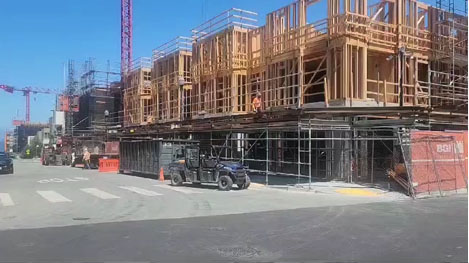
In cities like San Francisco, developers are increasingly required to include below-market-rate (BMR) units in their construction projects as a condition for securing permits. These BMR units are offered at reduced rents, allowing lower-income residents to remain in the city despite its notoriously high housing costs. On the surface, this policy seems like a win-win for both the city and its residents. The city addresses its housing crisis while giving residents access to affordable housing in an otherwise unaffordable market. However, this policy comes with hidden drawbacks, perpetuating poverty and limiting the financial mobility of those who live in these units.
One major problem with this arrangement is the income cap imposed on tenants of BMR units. Residents must meet certain income requirements, typically earning no more than a specific threshold, to qualify for the reduced rent. While this ensures that the apartments go to those in need, it also creates an unintended consequence: a perpetual dependence on renting. Residents of BMR units are financially locked into a situation where they must stay under a certain income level to retain access to affordable housing, effectively preventing them from accumulating wealth or advancing economically.
This dynamic keeps BMR tenants as permanent renters, unable to own property. The path to homeownership, which is one of the most reliable ways to build wealth and secure long-term financial stability, is closed to them. Without the opportunity to own, these tenants are not just deprived of the chance to build equity but are also unable to pass on wealth to their descendants. As a result, generations of families remain stuck in a cycle of renting, never able to leverage property ownership as a tool for financial advancement.
The very structure of this policy seems counterproductive to the larger goal of reducing poverty and fostering economic independence. By focusing solely on keeping rents low and not addressing the broader need for wealth-building opportunities, San Francisco and other cities are perpetuating a system where low-income families are dependent on government-regulated housing indefinitely. Rather than empowering individuals to improve their financial situation, these policies trap them in a state of constant financial fragility.
It doesn’t have to be this way. In a previous editorial, I suggested a simple but transformative solution: allow tenants of BMR units to eventually purchase the properties they rent. By offering tenants the chance to own their apartments or condos, the city can enable these families to create wealth and achieve long-term financial independence. Ownership would empower these families to invest in their future, build equity, and break the cycle of poverty.
Imagine a scenario where, instead of capping a tenant’s income to maintain affordable rent, the city incentivizes long-term tenants to become homeowners. Over time, tenants could buy their units at a price aligned with their income and the market conditions. This could be done through a combination of city subsidies, favorable financing options, and shared-equity models, where the city retains partial ownership of the property to keep it affordable while still allowing the resident to build wealth.
Such a policy would fundamentally change the economic outlook for thousands of families. It would give them the financial security that comes with owning a home, the ability to pass down property to future generations, and a way to escape the never-ending cycle of rent dependency. This would be an investment not just in housing, but in the long-term economic vitality of the city and its residents.
The financial benefits of homeownership extend far beyond the individual. When families own property, they have a greater stake in their community, contributing to neighborhood stability and fostering a sense of ownership and responsibility. Homeowners are also more likely to invest in their properties, improving the overall quality and value of housing stock in the city. Furthermore, property ownership helps diversify the city’s economic base, reducing reliance on government subsidies and fostering a more resilient local economy.
Yet, despite the clear advantages of such a shift, none of the current candidates for mayor or city supervisor in the upcoming November 5, 2024, election are proposing this kind of policy. Their platforms continue to focus on traditional affordable housing models that prioritize rent control and income caps without addressing the long-term economic impacts of keeping families dependent on renting. This oversight is disqualifying, in my opinion. San Francisco needs leaders who understand that real solutions to poverty go beyond temporary rent relief. We need policies that empower people to build wealth, not just scrape by month to month.
If San Francisco’s leadership is serious about reducing poverty and fostering economic equity, they need to think beyond rent control. They must embrace policies that allow families to own property, build wealth, and secure their financial futures. The current model of BMR housing may provide short-term relief, but it is a band-aid solution to a much deeper problem. By restricting renters’ income and limiting their ability to own property, we are perpetuating a system that keeps low-income residents in a cycle of poverty, unable to break free from the financial constraints imposed on them.
Ultimately, the solution to San Francisco’s housing crisis isn’t just more affordable rental units; it’s creating pathways to ownership. By allowing tenants of BMR units to transition from renters to owners, the city can empower these families to take control of their financial futures and build lasting wealth. This is the only way to truly eradicate poverty and end dependency on government subsidies. It’s time for a bold new approach to housing policy—one that prioritizes economic empowerment and financial independence over temporary fixes.
As voters head to the polls this November, they should demand more from their candidates. We need leaders who are willing to think beyond the status quo and propose policies that will create real, lasting change. Housing policy should be about more than just keeping people in their homes; it should be about helping them own their homes and secure their financial futures. Anything less is a disservice to the very people these policies are meant to help.



